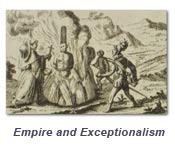Date/Time
Friday, March 6, 2015–Saturday, March 7, 2015
All Day
Location
William Andrews Clark Memorial Library
2520 Cimarron Street
—a conference organized by Andrew Devereux, Loyola Marymount University, and Anthony Pagden, University of California, Los Angeles
 The conference addresses the justifications for conquest and empire in the early modern Spanish world by examining them against the broader panorama of European colonial ventures in the Mediterranean, the Atlantic, and beyond. Using the Spanish Requerimiento as a point of departure, “Empire and Exceptionalism” explores a comparative approach to the foundation of empires in the Old World and the New. To justify and rationalize their expansion, medieval and early modern powers often drew on shared legal and historical traditions. Their claims, while obviously oppositional, were in constant dialogue with one another. For instance, recent work has suggested that the Requerimiento was based on traditions of medieval Islamic jurisprudence that addressed the treatment of conquered peoples. How would such traditions have intersected with canon law, humanist traditions, and other justifications for empire? How disparate, ultimately, were the different imperial projects, and how significant were the distinctions? “Empire and Exceptionalism” thus engages some of the most pressing historical questions concerning the origins of European colonialism by examining Mediterranean and Atlantic processes in conjunction with one another and by addressing the degree to which the practices engaged in by the early modern Spanish Empire were exceptional.
The conference addresses the justifications for conquest and empire in the early modern Spanish world by examining them against the broader panorama of European colonial ventures in the Mediterranean, the Atlantic, and beyond. Using the Spanish Requerimiento as a point of departure, “Empire and Exceptionalism” explores a comparative approach to the foundation of empires in the Old World and the New. To justify and rationalize their expansion, medieval and early modern powers often drew on shared legal and historical traditions. Their claims, while obviously oppositional, were in constant dialogue with one another. For instance, recent work has suggested that the Requerimiento was based on traditions of medieval Islamic jurisprudence that addressed the treatment of conquered peoples. How would such traditions have intersected with canon law, humanist traditions, and other justifications for empire? How disparate, ultimately, were the different imperial projects, and how significant were the distinctions? “Empire and Exceptionalism” thus engages some of the most pressing historical questions concerning the origins of European colonialism by examining Mediterranean and Atlantic processes in conjunction with one another and by addressing the degree to which the practices engaged in by the early modern Spanish Empire were exceptional.
Speakers:
Adam G. Beaver, Princeton University
Andrew Devereux, Loyola Marymount University
Claire Gilbert, Saint Louis University
William S. Goldman, University of San Francisco
Camilo Gómez-Rivas, University of California, Santa Cruz
Seth Kimmel, Columbia University
Andrew Laird, University of Warwick
István Szászdi, Universidad de Valladolid
Emily Weissbourd, University of Pennsylvania
Program
Friday, March 6
9:30 a.m.
Morning Coffee and Registration
10:00 a.m.
Barbara Fuchs, University of California, Los Angeles
Welcome
Andrew Devereux, Loyola Marymount University
Opening Remarks
10:15 a.m.
Session 1: The Legacy of Islamic Iberia
Chair: Heather Ferguson, Claremont McKenna College
Camilo Gómez-Rivas, University of California, Santa Cruz
“Accommodation and Displacement in Times of Conquest: Subject-hood, Identity, Reciprocity”
István Szászdi, Universidad de Valladolid
“The Requerimiento: 500 Years in the Development of an Hispanic Institution (11th–16th Centuries)”
Claire Gilbert, Saint Louis University
“The Contracts of Conquest: Treaties of Conversion in Mudéjar and Morisco Granada”
Q & A
12:30 p.m.
Lunch
1:30 p.m.
Session 2: Children of Abraham and Iberian Empire
Chair: Daniela Bleichmar, University of Southern California
Andrew Devereux, Loyola Marymount University
“A Mediterranean Counterpart to the Requerimiento?: Juan López de Palacios Rubios’ Justification for Spanish Conquests in Africa and the Holy Land”
Seth Kimmel, Columbia University
“Fashioning Precedent: The Imperial Politics of New Christian Assimilation”
Q & A
3:00 p.m.
Coffee Break
3:15 p.m.
Session 3: Spanish Monarchs, the Papacy, and a New World Order
Chair: Kevin Terraciano, University of California, Los Angeles
Adam G. Beaver, Princeton University
“Was the Reconquista a Precedent for Empire? Atlantic Conquest in Light of Spain’s Mediterranean Diplomacy”
William S. Goldman, University of San Francisco
“’Islands of the Ocean Sea’: The Requerimiento and European Expansion in the New World”
Q & A
4:45 p.m.
Reception
Saturday, March 7
9:30 a.m.
Morning Coffee and Registration
10:00 a.m.
Session 4: Spain and its Imperial Rivals in the Early Modern Atlantic
Chair: Rachel Sarah O’Toole, University of California, Irvine
Andrew Laird, University of Warwick
“Constructing Native Responses to the Requerimiento in Sixteenth-Century New Spain
Emily Weissbourd, University of Pennsylvania
“Echoes of the Requerimiento in English Imperial Ventures”
Q & A
11:45 p.m.
Roundtable Discussion
12:15 p.m.
Program concludes

